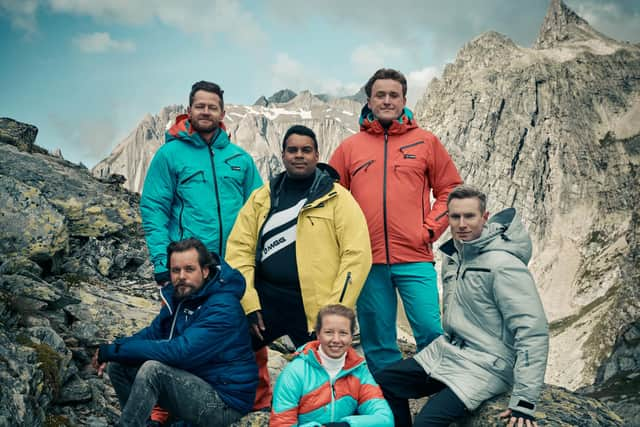Edinburgh Uni graduate's plan to green the ski gear industry


It’s hard, in the aftermath of COP26, to be optimistic about climate change, and in particular to keep on worrying about the little things. If, after a fortnight of frenetic, no-holds-barred negotiations in Glasgow, we are “still knocking on the door of climate catastrophe” – as UN secretary general Antonio Guterres put it – then what does it matter, really, if you decide to forget about food miles for a day and treat yourself to an avocado from Peru?
At times like this it’s good to recall the wise words of Lauren MacCallum, general manager of environmental pressure group Protect Our Winters UK, who, in an interview in this slot last year, spoke of the importance of blue-sky thinking in tackling global warming. “Trying to create perfect people inside an imperfect system is never going to work,” she said, “so we really focus on that, and we focus on what does the new system look like? What does a low-carbon society look like? We try to focus on what the solutions are – because we may be part of the problem, but we are also part of the solution.”
Advertisement
Hide AdAdvertisement
Hide AdIt's bold new ideas that will save us, in other words, not – as MacCallum puts it – “trying to beat people over the head with climate science so they go and live under rocks in the Cairngorms”. Rather than trying to change our behaviour within the existing system, she argues, we should be focusing our energies on changing the system itself.
As its name implies, Protect Our Winters grew out of the world of snowsports, and while that world has a positively elephantine carbon footprint – all those flights, all that shiny gear, all that hearty, meat-based mountain food – that doesn’t mean that all those involved in it should automatically be disqualified from the conversation. If anything, because winter sports lovers have a lot to lose from global heating, they should be highly motivated to do something about it. All of which brings us to the innovative new marketing campaign from Swiss ski brand Mont Gele Gear.
Founded in 2019 and based in Verbier, the company specialises in making high-end ski jackets and salopettes and aims to be completely up-front with consumers about where the materials in its garments come from, where they are assembled and at what cost. The key word for the company’s CEO Thomas A Bata, an Edinburgh University graduate and grandson of the creator of the Bata shoe empire Thomas J Bata, is transparency. “Most brands promise a lot,” he says, “but when you go beyond the smoke the real information is buried deep in an annual report, if at all. Generally, it’s not very gratifying, hence why it is hard to find.”
A visit to the Mont Gele Gear website confirms that they have indeed gone for a full-disclosure approach. Click on the link to their Lyngen Touring Shell Pro Jacket and you get all the information you'd expect in the main description, from the stuff it’s made out of (Pertex Shield 20K waterproof shell fabric, YKK Aquaguard zips) to the ski-specific features (helmet-sized hood, lift pass pocket). Scroll down a bit, though, and click on the section that says “radical transparency” and you’ll see something that really does feel radically transparent: a complete breakdown of where all the different materials in the jacket came from, where they were assembled, and how much everything cost as a percentage of the sale price.
So, for example, you can see at a glance that the shell fabric, zips and Velcro for the Lyngen jacket all came from China, the fabric used to make the pockets came from Italy and the eyelets the hood toggle elastic passes through came from Latvia. You can see that the jacket was manufactured in Slovakia – nothing too radical about that, perhaps – but you can also see that, of the £479.20 RRP, 23 per cent went on materials, 19 per cent went on design and marketing, ten per cent went on manufacturing and five per cent went on logistics. Of the remaining 43 per cent, 20 per cent went on taxes, 12 per cent went towards the company’s “rent and operations” and finally, 11 per cent is deemed “admin and profit”.
Below all that, there’s a section marked “Carbon Footprint” telling you the total footprint of a single Lyngen jacket (including standard delivery) is 36.08kg of CO2, and assuring you that Mont Gele Gear have partnered with carbon offsetting company Forestmatic to plant a new tree in the tropics for every online and offline order they receive, ensuring all purchases are 100 per cent carbon neutral.
The Mont Gele Gear team say their goal with all this is to lead by example and to “challenge the industry to follow suit”. A quick check of the websites of several major ski gear manufacturers suggests that nobody else is anywhere near as forthcoming about how their garments are made, let alone how their costs break down. The ones who have nothing to hide would do well to take up the Mont Gele Gear challenge as soon as they can; being on the right side of history is a fantastic marketing tool.
For more on Mont Gele Gear, see www.mgg.ski
A message from the Editor:
Thank you for reading this article. We're more reliant on your support than ever as the shift in consumer habits brought about by coronavirus impacts our advertisers.
If you haven't already, please consider supporting our trusted, fact-checked journalism by taking out a digital subscription at https://www.scotsman.com/subscriptions